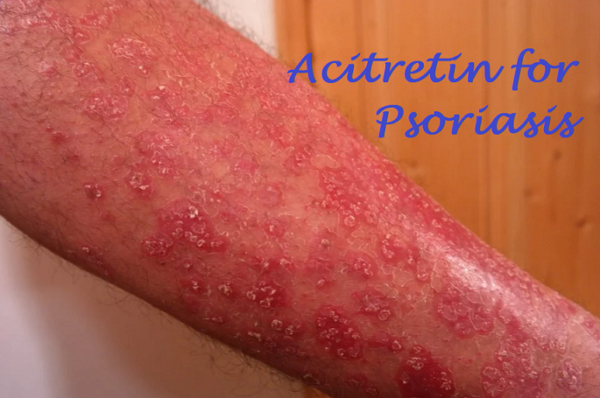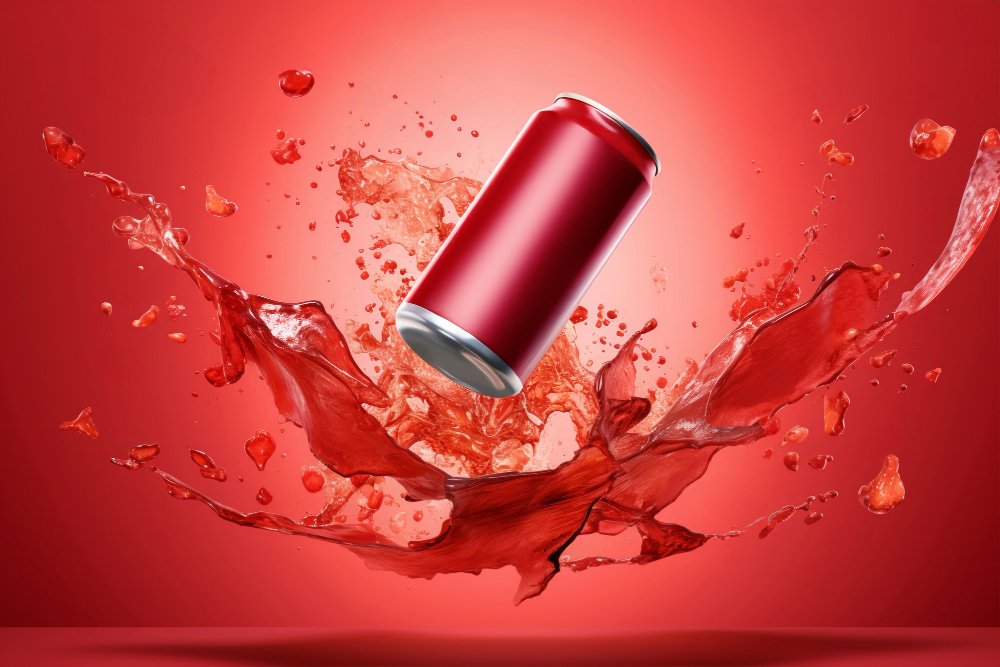Acitretin (Soriatane) is used to treat severe psoriasis resistant to other medicines.
It is also used to treat palmoplantar psoriasis and severe congenital ichthyosis. It should be only taken when advised by experts.
Acitretin in Psoriasis:
- Acitretin and other oral vitamin A derivatives are the drug choice for pustular and erythrodermic psoriasis.
- Oral retinoids in combination with topical retinoids like adapalene are also considered to be very effective for the treatment of plaque psoriasis.
- It has also been noticed that psoriasis Vulgaris better responds to UVB therapy when combined with oral acitretin.
- The lesions clear faster than with UVB therapy alone. Furthermore, improvement in the symptoms of psoriasis and clearing of the lesions occur in a dose-dependent fashion.
- The dosage of acitretin (Soriatin) is taken daily in increments of 10 milligrams, 25 milligrams, milligrammes, and milligrams. The dose is raised every two to four weeks until toxicity occurs or the problem gets better.
Acitretin in severe psoriasis:
- Studies in patients with severe psoriasis have shown that oral acitretin markedly augments the efficacy of PUVA therapy in severe psoriasis.
- 80% of the patients in the PUVA therapy had a good response while 96% of the patient in the combination therapy (PUVA plus oral acitretin) had complete clearance of the lesions.
Acitretin for nail psoriasis:
- Although the treatment of choice for nail psoriasis is either adalimumab or infliximab, oral acitretin has also been found to be useful when given in a low dose for a prolonged period.
- When used in higher doses than those used for skin psoriasis, it may cause brittle nails, paronychia, and granulomas.
- One study noticed an improvement in 40 - 50% of the patients with nail psoriasis when acitretin was given in a dose of 0.2 to 0.3 mg/kg per day for six months.
- Another study found impressive results in patients with nail psoriasis when acitretin was used in combination with urea nail lacquer.
Acitretin for other skin conditions:
- Hidradenitis suppurativa is a long-term, usually recurrent illness of the skin that involves the sebum-producing glands in the groin, axillae, buttocks and beneath the breasts.
- Topical antiseptics, anti-inflammatory drugs, and oral antibiotics are typically used to treat it.
- Patients who have recurrent and disabling diseases may benefit from long-term use of acitretin.
- One study found it effective in patients with refractory disease. One patient with recalcitrant nodulocystic acne and hidradenitis suppurativa was treated effectively with acitretin.
Acitretin Contraindications
- Patients who are taking oral acitretin shouldn't use excessive sunlight or sunlamps.
- Regular blood sugar checks are important as they can alter glucose tolerance. Patients who have chronically elevated blood lipid levels, those using tetracyclines and methotrexate and patients with hypersensitivity to any retinoid should avoid it.
- Blood donations should not be made by patients while they are receiving therapy or for two years after it.
- All women over 18 years old who are pregnant should have a monthly pregnancy test.
- It is not recommended for patients with advanced kidney and liver disease.
- Alcohol should be avoided by patients as it can cause toxic effects and increase half-life.
Monitoring Parameters
- It is recommended that patients monitor their serum cholesterol levels and serum triglyceride levels for at least one month.
- Liver function should always be checked for at least two to four weeks during the first two months and three times per month thereafter.
Acitretin 10 mg and 25 mg dose in Adults:
- Adults should start with a dosage of 10 mg per day for 2-4 weeks.
- In cases with severe psoriasis and severe Darier's disease with an inadequate response, the dose may be raised to 75 mg per day for a brief period of time.
Dose in Children:
Rarely do children have a severe disease that warrants its use. Conditions which respond well to acitretin include:
- With a psoriasis area severity rating of higher than 10, extensive plaque psoriasis
- Von Zumbusch's illness is another name for generalised pustular psoriasis (GPP).
- Erthyrodermic psoriasis
- Very incapacitating palmoplantar psoriasis
- Pustulosis of the palm and heel.
Acitretin Dose in children:
The typical dosage ranges from 0.5 to 1 mg per kg per day.
Use in kidney disease:
- The manufacturer has not provided dosage adjustments for renal disease.
- Due to the elevated risk of toxicity, it should be avoided in severe renal disease.
Use in Liver disease:
- Because of the elevated risk of hepatic failure, acitretin should be avoided in situations of liver disease.
How and when to take acitretin?
- Take Acitretin with food, preferably with the main meal of the day.
- Concomitant use of vitamin-A and its derivatives should be avoided.
- Similarly, alcohol and alcohol-containing products should also be avoided.
Pregnancy Risk Factor "X"
-
Acitretin is Contraindicated in Pregnancy
- U.S. Boxed Warning
-
Use of this medication is not advised for women who are or want to become pregnant.
- Teratogenic effects have been shown to result from the human use of acitretin.
- Patients who were taking acitretin recently or used it in the past have had severe birth defects.
- Anticipitin is contraindicated in pregnancy. The duration of acitretin's action is prolonged by alcohol.
- Seminal fluid also contained a small amount of acitretin. However, it has no effect on spermatogenesis and sperm motility in men.
-
Use during breastfeeding:
- Maternities should not be given Acitretin before or during breastfeeding.
Side effects of Acitretin:
- When acitretin is administered in a dose corresponding to 25 mg or more per day, side symptoms are typically observed.
- Alopecia, palm and sole peeling, and cheilitis are the most typical adverse effects.
- Abnormalities in the laboratory parameters include raised triglyceride and total cholesterol levels and transaminitis (abnormalities in the liver functions)
Common side effects of Acitretin:
- dryness of conjunctiva (causing conjunctivitis and decreased tolerance to contact lenses)
- alopecia (reversible on withdrawal)
- brittle nails
- pruritus
- Abdominal pain
- abnormal hair texture
- diarrhea
- erythema
- nausea
- paronychia
- peripheral edema
- a reversible increase in serum cholesterol (with high doses)
- dermatitis
- headache
- myalgia
- sticky skin
- arthralgia
- vomiting
- a reversible increase in serum-triglyceride concentrations (with high doses)
- epidermal fragility
- skin exfoliation
- dryness and inflammation of mucous membranes
Less common side effects:
- Dizziness,
- visual disturbances
- hepatitis
- photosensitivity
Rare side effects include:
- bone pain
- exostosis
- night blindness
- Peripheral neuropathy
- benign intracranial hypertension
- ulcerative keratitis
- granulomatous lesions
- impaired hearing
- drowsiness
- dry skin
- flushing
- sweating
- taste disturbance
- tinnitus
- initial worsening of psoriasis
- malaise
- rectal hemorrhage
Acitretin Mechanism of Action:
- Interleukin-6, MRP-8, and other pro-inflammatory cytokines are inhibited by acitretin.
- It activates the nuclear subtypes alpha-beta and gamma of retinoid receptors, as well as retinoic acid, receives (RXR span> This has an anti-inflammatory and antiproliferative effect, which results in normal keratinocyte growth.
The effects of acitretin may not become apparent for two to three months.
For full effects, it may take up to six months. Occasionally, the symptoms worsen after initiating therapy.
It is best absorbed when taken with food and 99% of it is bound to albumin.
The half-life elimination of Acitretin is 49 hours, and the half-life of the metabolites of acitretin may range up to 170 days.
Time to peak effect: 2-5 hours
Excretion: 50% of it is excreted via feces while the rest via urine.
Acitretin brands in Pakistan:
A-Sone (Navegal laboratories)
Capsules: 25 mg :
30 capsules pack: Rs. 1310
Acetin (Genome pharmaceuticals (PVT) LTD)
Capsules: 25 mg :
30 capsules pack: Rs. 580
Capsules: 25 mg :
30 capsules pack: Rs. 1310
Acetretin (Fassegen pharmaceuticals)
Capsules: 25 mg :
not available.
Aciadvan (Advanced pharmaceuticals)
Capsules: 25 mg :
30 tablets pack: Rs.1310
Acitic (Pnacea pharmaceuticals)
Capsules: 25 mg :
30 capsules pack: Rs. 1310
Acitrilex (Ambrocia pharmaceuticals)
Capsules: 25 mg :
30 capsules pack: Rs. 1310
Asset (Pearl pharmaceuticals)
Capsules: 25 mg :
30 capsules pack: Rs. 1250
Cristin (Good man pharmaceuticals)
Capsules: 25 mg :
30 capsules pack: Rs.1310
Neotigason (Rokei pakistan LTD)
Capsules: 10 mg :
30 capsules pack : 713.80
Capsules : 25 mg :
30 capsules pack : Rs. 1658.24
Neotret (Pharma health pakistan LTD )
Capsules : 10 mg :
10 capsules pack : Rs. 210
Capsules : 10 mg :
20 capsules pack : Rs.400
Capsules : 10 mg :
30 capsules pack : Rs. 580
Capsules : 25 mg :
30 capsules pack : Rs. 1310
Tigasor (Shrooq pharmaceuticals)
Capsules : 25 mg :
30 capsules pack : Rs. 1310
International Brands:
-
Acetec
-
Acitrexol
-
Neotigason
-
Soriatane




